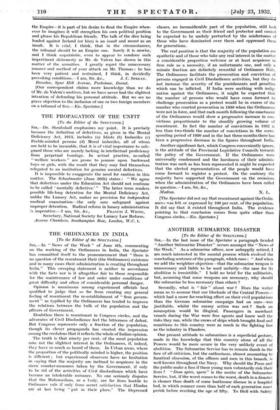THE ORDINANCES IN INDIA
[To the Editor of the SPECTATOR.] "News of the Week" of June 4th, commenting on the working of the Ordinances in India, the Spectator has committed itself to the pronouncement that "there is no question of the resentment their (the Ordinances) existence and in many cases their administration is creating throughout India." This sweeping statement is neither in accordance with the facts nor is it altogether fair to those responsible for the maintenance of law and order under conditions of great difficulty and often of considerable personal danger. Opinion is unanimous among experienced officials best qualified to judge that so far from creating any general feeling of resentment the re-establishment of "firm govern- ment " as typified by the Ordinances has tended to improve the relations between the bulk of the population and the officers of Government.
Doubtless there is resentment in Congress circles, and the advocates of Civil Disobedience feel the bitterness of defeat. But Congress represents only a fraction of the population, though its clever propaganda has created the impression among the credulous that it reflects the whole of Indian opinion.
• The truth is that ninety per cent, of the rural population take not the slightest interest in the Ordinances, if, indeed, they have so much as heard of them. In Urban areas, where the proportion of the politically minded is higher, the position is different ; but experienced observers have no hesitation in saying that the majority are inclined to acquiesce in the stern counter-measures taken by the Government, if only to be rid of the activities of Civil disobedience which have become an intolerable nuisance. No one seriously disputes that the Mahomedans, as a body, are far from hostile to Ordinance rule if only from secret satisfaction that Hindus are at last being "put in their place." The Depressed classes, no inconsiderable part of the population, still look to the Government as their friend and protector and cannot be expected to be unduly perturbed by the misfortunes of those who have dominated over them and oppressed them for generations.
The real position is that the majority of the population are apathetic and of those who take any real interest in the matter a considerable proportion welcome or at least acquiesce in firm rule as a necessity, if an unfortunate one, and only a minute fraction are definitely resentful of Ordinance Rule.
The Ordinances facilitate the prosecution and conviction of persons engaged in Civil Disobedience activities, but they do not increase the severity of .the punishments and penalties which can be inflicted. If India were seething with indig- nation against the Ordinances, it might be expected that the number of persons who would have come forward to challenge prosecution as a protest would be in excess of the number who courted prosecution in 1930 when the Ordinances were not in force, and that each month following the enactment of the Ordinances would show a progressive increase in con- victions proportionate to the steadily growing volume of resentment. In fact the number of convictions in 1932 is less than two-thirds the number of convictions in the corre- sponding period of 1980 and in the last three months there has been a progressive decrease in the figures throughout India.
Another significant fact, which Congress conveniently ignore, is the attitude of the Provincial Legislative Councils towards the policy of the Government. If the Ordinances were universally condemned and the harshness of their adminis- tration was such as has been represented it might be expected that the elected representatives of the people would have come forward to register a protest. On the contrary the majority have supported the Government on the occasions when the administration of the Ordinances have been called in question.—! am, Sir, &c.,
[The Spectator did not say that resentment against the Ordin. ances was felt or expressed by 100 per cent. of the population. It did say that it existed throughout India. The evidence pointing to that conclusion comes from quite other than Congress circles.—En. Spectator.]














































 Previous page
Previous page